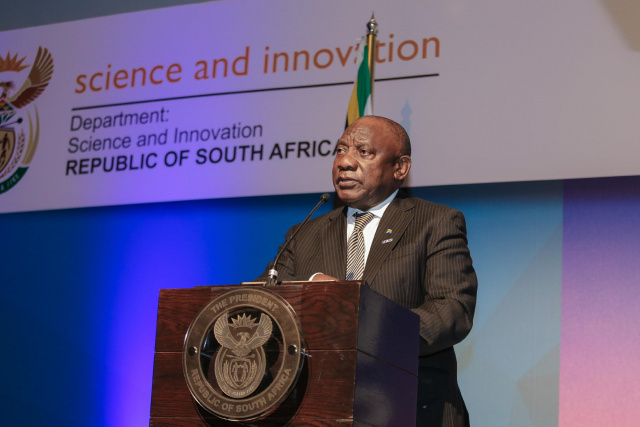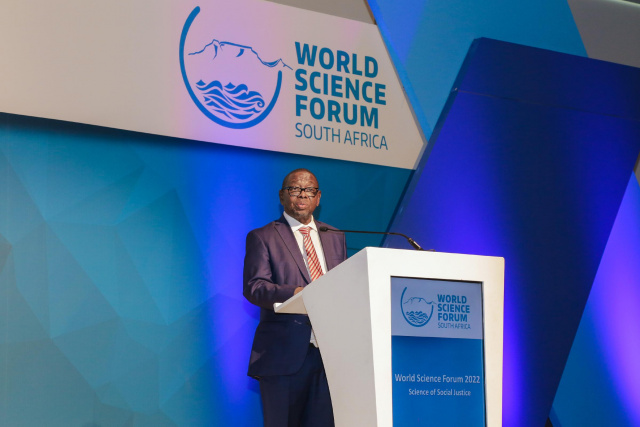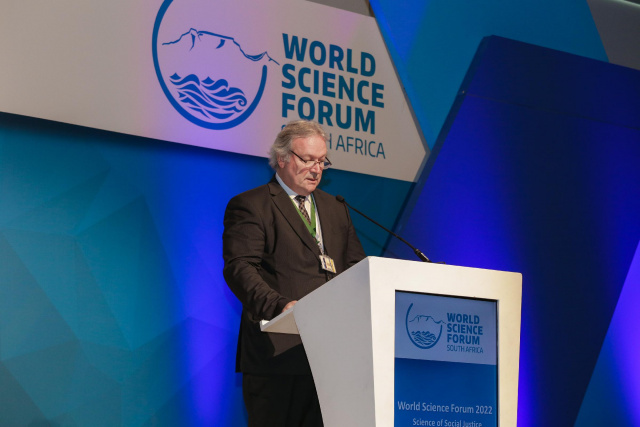“We cannot afford to waste talented minds anywhere in the world” – welcome address by Tamás Freund at the Opening Ceremony of the World Science Forum
To honour this year’s WSF motto of “Science for Social Justice”, all the speakers of the opening event urged the global scientific community with one voice to put science at the service of society, drawing on all the tools and means at hand, and to make a strong commitment to fighting against social inequalities and all the evils they bring. The World Science Forum in Cape Town officially began on 6 December with the Opening Ceremony, where the co-organising states were represented by their respective Heads of State and Ministers, with the international partner organisations represented by their top executives.
In his keynote address, South African President Cyril Ramaphosa reinforced his country’s commitment to international cooperation in science and recalled that as Africa was once the cradle of humankind, this continent is again ready to rise to the challenge of becoming a key player in finding scientific and social solutions to current global problems.
 Cyril Ramaphosa Photo: MPI
Cyril Ramaphosa Photo: MPIThe President stressed that his expectations are high for the closing declaration of the Forum, as in these times of crises looming over us, learned people – scientists – have a great opportunity, but at the same time, great responsibility, in working towards the improvement of people’s lives; in other words, in making this world a better place.
In her address delivered by Hungary’s Ambassador to South Africa, Hungarian President Katalin Novák praised the mission of the World Science Forum, which is to act as a bridge between the world of science and society. Over the years, the Forum has delivered on this mission to become a unique consultation forum that cannot be overlooked. Touching on the efforts of the scientific community for social justice, President Novák pointed out that social justice and peace go hand in hand, but without peace, science cannot fulfil its function. The scientific community must always be careful not to let their achievements be used to spur unrest; science should be used solely for the public good. With her closing words, the Hungarian President reminded the audience that the next World Science Forum, in 2024, to which she is very much looking forward, will again be hosted by Hungary.
Co-Chair of this year’s WSF Steering Committee, Mr Blade Nzimande, Minister for Higher Education, Science and Innovation of South Africa, delivered his welcome speech as the head of the ministry hosting the Forum.
 Bonginkosi Blade Nzimande Photo: MPI
Bonginkosi Blade Nzimande Photo: MPIWhat he singled out as the most important task awaiting this Forum was to find out how to conduct science in such a way as to be able to reach out to the most vulnerable groups of society all over the world. At a time when we cannot escape the effects of climate change and ecological disasters, there must be dialogue between the developed and the developing world about concerted actions, and dialogue between the different generations, where the views of the younger generations – young scientists for that matter – should be heeded in particular. It is their enthusiasm that can set an example and be a source of inspiration for the other age groups.
Taking the floor as the President of WSF and current Co-Chair of its Steering Committee, MTA President Tamás Freund gave a brief overview of the nearly two decades of the Forum’s history.
 Tamás Freund Photo: MPI
Tamás Freund Photo: MPIHe then went on to share his personal take on what science for social justice could mean. While science will always keep pushing boundaries through its relentless quest for breakthroughs, it must be ensured that the scientific achievements and the wealth whose generation they enable are distributed in a just, equitable and socially responsible manner throughout all layers of society and put to the best use for the benefit of all. For this to succeed, the commitment of the scientific community alone is not sufficient; political decision-makers and key actors in the global economy must be encouraged to accept their part in these efforts. As President Freund remarked, Africa has vast reserves of human and natural resources, as well as an extraordinary diversity of nature and cultures. He remarked,
“we cannot afford to waste talented minds anywhere in the world, and especially not the young generations of developing nations”
. In his concluding remarks, he underlined the importance of curiosity-driven, basic research in fulfilling the global ideal of social justice, and called for the conclusion of science agreements and the establishment of funding schemes whereby national science capacities can be upheld, as they are a prerequisite for global stability and sustainability.
Tamás Freund's speech - click here
All the supporting messages delivered by the leading figures of WSF’s partner organisations – UNESCO, ISC, AAAS, TWAS, EASAC, IAP and GYA – at the Opening Ceremony converged to express the same call to the scientific community for imminent action in tackling growing social inequalities, climate change and climate injustice, biodiversity loss, food insecurity and other global threats. This would require a continuous dialogue between science and society, political and economic leaders, civil society and the media, eventually leading to the concerted action of all these stakeholders.
One of the highlights of the opening event was the presentation of the Square Kilometre Array (SKA) project, an eminent example of international scientific collaboration in which scientists and engineers from around the world joined forces to design and build high-performing radio telescopes in South Africa and Western Australia with a view to enabling astronomers to fill in the gaps in our understanding of the universe. In parallel with the start of the WSF, in the Northern Cape province of South Africa a celebration was taking place to mark the formal start of construction of what will be the most advanced radio telescopes in the world. The chair of the council of the SKA Observatory, which is the intergovernmental organisation behind this unprecedented scientific endeavour, was also among the speakers at the Opening Ceremony.
Finally, to prepare the audience for the adoption of the Forum’s declaration, due for Friday’s closing ceremony, a roundtable discussion took place in which a panel of scientists and science policy advisers were able to share their interpretation of the role of science in achieving social justice. The draft text of the declaration is open for comments from the Forum participants until 8 December.
In the agenda of the Forum, which closes on Friday, all plenary and thematic sessions will be streamed live at this link.
